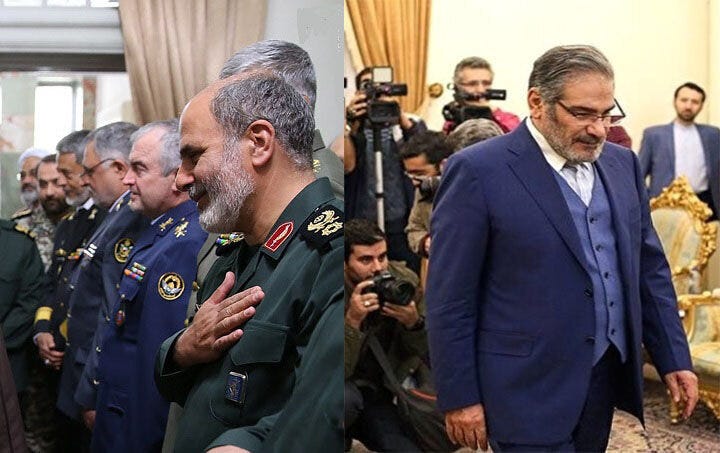Iran names new NSC chief
Former IRGC Joint Staff chief and member of Iran’s Expediency Council (and dentist) Ali Akbar Ahmadian succeeds Ali Shamkhani as SNSC secretary. Iran names ambassador to Saudi Arabia.

Iranian President Ebrahim Raisi on Monday named former Islamic Revolutionary Guard Corps (IRGC) Joint Staff chief General Ali Akbar Ahmadian as the new secretary of Iran’s Supreme National Security Council (SNSC), succeeding Ali Shamkhani, who led the body for the last decade.
“General Ahmadian, also a dentist, holds a master’s degree in Defense Studies and a doctorate in Strategic Management from the National Defense University,” Iranian outlet, Iran Nuances, which first reported on Sunday that Ahmadian was poised to replace Shamkhani, wrote.
Ahmadian, a member of Iran’s Expediency Council, served as commander of the IRGC Navy from 1997-2000, headed the IRGC Joint Staff from 2000 to 2007, and more recently served as director of the IRGC Strategic Center for several years, the outlet reported.
Rear Admiral & Dentist….who helped institutionalize IRGC Navy asymmetric warfare strategy
Ahmadian previously served as Shamkhani’s deputy in the late 1980s, in the Iranian navy.
After the Iran-Iraq war ended in July 1988, Ahmadian “was commissioned as a naval officer and appointed deputy chief of the Iranian Navy, then under the command of Rear Admiral Ali Shamkhani,” University of Southern California professor Muhammad Sahimi reported for PBS’s Tehran Bureau in 2012.
In 2000, “Khamenei appointed Ahmadian chief of staff of the Guards’ forces,” the Tehran Bureau report continues. Ahmadian “is credited as one of the very first senior officers to institutionalize the strategy of asymmetric warfare in Iran’s military doctrine. It was under his command that the Guards’ navy developed its asymmetric warfare strategy to counter the Bahrain-based U.S. Fifth Fleet.”
Ahmadian “is known to be a hardliner who believes that the Guards are justified in intervening in all aspects of national affairs to ‘protect the Revolution,’” the Tehran Bureau report continued. “He has also said that while the threat of what he calls ‘soft power’ has been recognized by the Islamic Republic’s leadership, not much attention has been paid to what he calls the ‘soft threat’—presumably that of Western culture, and more generally, the Internet and social media networks.”
“All prior SNSC secretaries have been high-profile politicians,” Amwaj Media reported on the shuffle. “In contrast, Ahmadian…is virtually unknown on the political stage.”
Iranian Supreme Leader Ali Khamenei named outgoing SNSC Secretary Shamkhani as a member of the Expediency Discernment Council and his political advisor, Iranian journalist Abas Aslani reported.
Shamkhani “had originally been due to step down in the autumn of 2021, after Raisi took office,” the Amwaj report continued. “Ultimately, with the backing of Khamenei, a decision was made to retain Shamkhani in his position, chiefly to oversee negotiations to revive the Iran nuclear deal. Notably, the outgoing SNSC secretary also led risky diplomatic initiatives with regional and western governments. This role has been important as the conservative takeover of all branches of power in 2021 left Khamenei without a face saving way to change course. In the past, the supreme leader was able to easily display flexibility by authorizing the pro-reform executive branch to stick out its neck.”
A western-based Iran watcher, speaking not for attribution, said her initial impression is that Ahmadian won’t rock the boat too much at this stage. But, as with other Iranian power centers since Raisi’s 2021 election, the SNSC will lean a bit more to the right, and in favor of the IRGC’s voice, on key security matters.
“IRGC consolidation of power,” Ali Vaez, director of the Iran program at the International Crisis Group, interpreted the Ahmadian appointment. But he added that Ahmadian is not a fanatic.
Iran names veteran diplomat as ambassador to Saudi Arabia
Iran on Monday also named Dr. Alireza Enayati as Iran’s Ambassador to Saudi Arabia. Enayati, Iranian Assistant Minister of Foreign Affairs, previously served as Iran’s ambassador to Kuwait, and as Director General of the Persian Gulf Department in the Iranian Ministry of Foreign Affairs.
New US State Department spokesperson Matthew Miller declined to comment on the specific ambassadorial appointment, but reiterated that the United States welcomes the Saudi-Iranian diplomatic engagement.
“I don’t have any comment on the appointment of a new ambassador,” Miller told journalists at the State Department press briefing on Monday (May 22). “That’s an issue between Iran and Saudi Arabia.”
“We welcome diplomatic engagement in the region,” Miller said. “But if any such diplomatic engagements could lead Iran to curtail its malign activities in the region, we would of course support that.”
Saudi Arabia last week reportedly named the current Saudi ambassador to Oman, Abdullah bin Saud Al Anzi, as the kingdom’s next ambassador to Iran.
G7 leaders meeting in Hiroshima, Japan, last weekend welcomed Saudi Iran engagement and other efforts to deescalate tensions in the region. But they expressed deep concern about Iran’s advancing nuclear program, and Iran’s transfer of armed drones to Russia being used to attack Ukraine’s civilian infrastructure, as well as Iran’s repression of recent protests spurred by the death of Mahsa Amini.
“We reiterate our clear determination that Iran must never develop a nuclear weapon,” G7 leaders said in point 56 of their Hiroshima communique May 20. “A diplomatic solution remains the best way to resolve this issue. In that context, the Joint Comprehensive Plan of Action continues to provide a useful reference.”
A European diplomat, asked if Iran was sending any new signals on stalled nuclear negotiations, replied: “Zero.”
**


